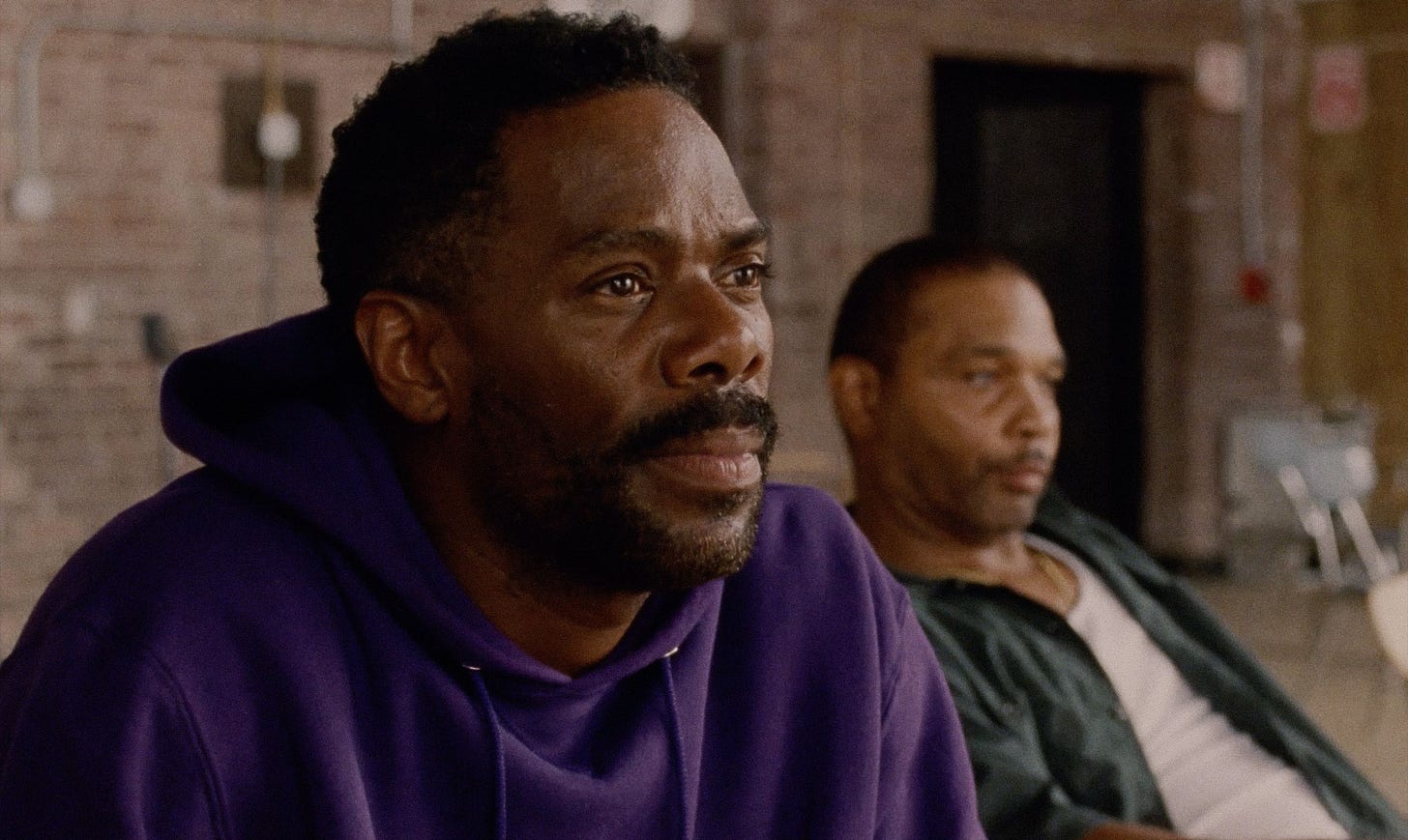Sing Sing
Colman Domingo leads an amazing cast of actual members of the infamous prison theatrical troupe, as broken men put the pieces back together through creating art.
We’ve seen lots of stirring prison movies, but never one quite like “Sing Sing.”
It’s about a bunch of broken men at the infamous facility who are members of an acting troupe, putting on Shakespeare and other productions for the other inmates. In this way, they try to assemble the broken pieces of their shattered souls.
Colman Domingo, an Oscar nominee for last year’s powerhouse turn in “Rustin,” leads an outstanding ensemble cast that includes Paul Raci, himself an Oscar nominee for “Sound of Metal.” But almost the entirety of the rest of the cast are actual former inmates at Sing Sing, gradutes of the Rehabilitation Through the Arts program. This is the first screen credit for most of them.
The result is a film that is completely organic and heartfelt, with no false moments or big Hollywood speeches. There are times we root for these men, and other times we are afraid for them… and even of them. It’s not always an easy journey, but one well worth taking.
Colman plays John Whitfield, a smart and educated man who is the star of the RTA. Not only does he usually play the lead role, he writes his own original plays that they stage and has even gained a following outside the prison. Early on, another inmate asks for his autograph.
His best friend is Mike Mike (Sean San José); they live next door to each other in cells B27 and B28. Mike Mike, who gets a wrenching soliloquy describing the origin of his nickname, has a caustic sense of humor but is a good egg. It seems at first the movie will orbit around this friendship.
Raci plays Brent, the non-inmate director of the plays who does this for the nourishment of his own soul. He leads them through the usual goofy acting exercises and encourages them to find a peaceful place inside from which art can grow.
They have just finished a production of A Midsummer Night’s Dream, and in deciding on their next project they decide to do comedy, the first they’ve ever tried. They come up with a crazy time-skipping piece of farce. John goes along, but is skeptical.
“Dying is easy,” John warns. “Comedy is hard.”
Sing Sing is still a very rough place, and John and Mike Mike witness a very tough-looking dude browbeating a young new inmate out of money. It turns out his name is Divine Eye (Clarence Maclin), and surprisingly he is interested in joining the RTA. They are suspicious that it’s some sort of con, but they let him audition and he turns out to be good enough.
Then a very strange thing happens. Divine Eye actually begins to outshine John and push him aside. They try out for the same role of Hamlet in the new play, and the other RTA members give him the part.
Even their names seem to be in competition, with John mostly known as Divine G.
Still, John tries to be supportive of the group and takes Divine Eye aside to offer advice. (For example, in the troupe they don’t call each other the n-word but use the term “beloved.”) This is brusquely refused, even mistaken as a sexual overture, and it appears that the story will steer down a very dark and deep descent.
But then… well, you’ll see.
Director Greg Kwedar wrote and produced the excellent, virtually unseen “Jockey” from a couple years ago, and shows a firm, understated hand for this material and cast. The other principle actors include Sean "Dino" Johnson, Patrick "Preme" Griffin, Jon-Adrian Velazquez and David "Dap" Giraudy — many of them playing themselves.
The screenplay, credited to Kwedar and Clint Bentley, takes its inspiration from a variety of sources, actual experiences of RTA members woven into some of their fictional productions. Maclin and the actual John Whitfield are given story credits, and the ‘based on’ attribution goes to plays by Brent Buell and John H. Richardson.
Divine Eye, initially presented as the antagonist, undergoes the biggest change in the audience’s eye. A scary-looking dude with hard eyes and snaggleteeth, Divine Eye gradually lets down his guard, bit by bit, and we learn more about him and why he is so affixed on being the top dog on the block. In a heartbreaking moment, he reveals that all his friends and even his grown son are also in prison.
“What I got out there?” he says when John offers to help him with his parole essay. “All my people in here.”
“Sing Sing” is extraordinary precisely because it is in so many ways ordinary.
These are the stories of men who have screwed up, stole, lied and hurt others — even killed. But still there is humanity and poetry in their lives, and by coming together to spend months working on zero-budget plays — sometimes one-night only performances — they allow themselves the possibility that they can free their spirit beyond those cold, ugly walls.





